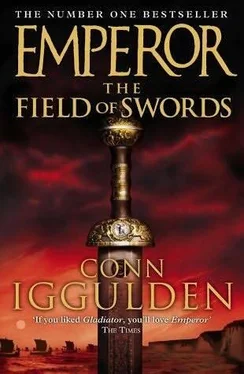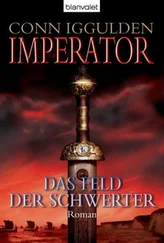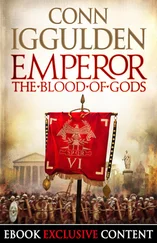One of them grimaced. “Clodius won’t let you get away with this, you know. He will raise hell in the morning.”
“Perhaps. I may have a chance to speak to him before he does. He may be reasonable.”
“You don’t know him, do you?” the man said, grinning.
Brutus began to relax. “Are you going to go home, then? It’s too cold to be standing out here.”
The man looked around at the last pair of his companions. “I think I will,” he said. “Was it true what you said?”
“Which part?” Brutus replied, thinking of his nonexistent archers.
“About being a friend of Caesar?”
“We’re like brothers,” Brutus said easily.
“He’s a good man for Rome. Some of us wouldn’t mind seeing him come back. Those with families, at least.”
“Gaul won’t hold him forever,” Brutus replied.
The man nodded and walked away into the dark with his friends.
Brutus slept on the floor of the shop for a full week. The night after the failed attack, he visited Clodius’s town house in the center of the city, but found it better protected than a fortress and bristling with armed men. His sense of worry only deepened as the days crept by. It was as if the city were holding its breath.
Though Tabbic accepted his advice and kept his family away from the shop, Alexandria insisted on staying and grew more and more irritable each day she was forced to spend sleeping on the hard floor. All her wealth was tied up in the new premises, from the walls and roof to the stocks of precious metals and the enormous forges. She would not leave it and Brutus could not return to the north while he felt she was in danger.
The young men who had stood with them against the collectors also stayed. Tabbic had offered them a salary as temporary guards, but they waved his coins away. They idolized the silver general who had called for their help, and in return Brutus spent a few hours each day teaching them how to use the swords they carried.
The tense crowds thinned around noon, when much of the city paused to eat. Brutus went out then with one or two of the young men, to gather food and information. At least they could always prepare a hot meal on the forges, but the usual gossip of the markets seemed to have been stifled. At best, Brutus could only pick up a few fragments here and there, and he missed having his mother in the city. Without her, the details of the Senate meetings were unknown, and Brutus felt an increasing frustration and blindness as the city wound tighter and tighter each night.
Though Pompey had returned to Rome, there seemed to be no order on the streets, especially after dark. More than once, Brutus and the others were woken from sleep by dim, muffled sounds of conflict.
From the roof, they could see the distant glow of fires somewhere in the maze of backstreets and alleys. The armed gangs made no second attempt to attack the shop, and Brutus worried that their masters were involved in a more serious struggle.
In the middle of the second week, the markets were full of the news that Clodius’s raptores had attacked the house of the orator Cicero, trying to trap him inside as they set it alight. The man escaped them, but there was no outcry against Clodius, and to Brutus it was another sign that law in the city had broken down. His arguments with Alexandria became more heated and at last she agreed that they should all leave and wait out the crisis at Julius’s estate. Rome was fast becoming a battleground by night and the shop was not worth their lives. For one who had been a slave, though, the shop was the symbol of everything she had achieved, and Alexandria wept bitterly at leaving it for the gangs.
Following her directions, Brutus risked a trip to Alexandria’s house to pick up clothes and came back with Octavian’s mother, Atia, to add to those who huddled in the shop as darkness fell.
Each day became an agony of frustration for the young general as he waited for the right time to shepherd the group to Julius’s estate. If he had been alone, it would have been simple enough to join Pompey’s legion at their barracks. As it was, the crowd of people looking to him for safety seemed to grow each day. Tabbic’s sister had brought her husband and children into the safety of the shop and joined Tabbic’s three young daughters. The families of the young men had swelled their number still further, and Brutus despaired at the thought of moving twenty-seven people through the violent city, even in daylight.
When the Senate declared a general curfew at sunset, Brutus decided he could wait no longer. Only lawabiding citizens seemed to obey the edict of the Senate. The curfew had no effect on the roving gangs, and that same night the street next to the shop was set alight, with pitiful screams sounding in the darkness until they were consumed.
As the sullen city stirred the following morning, Brutus armed his group with anything that Tabbic could find, from swords and knives to simple iron bars.
“It’s going to be a good hour through the streets, and you could see things that will make you want to stop,” he said to them. He knew they looked to him to save them, and he forced himself to remain cheerful in the face of that trust.
“No matter what happens, we do not stop, does everyone understand? If we are attacked, we cut and keep moving. Once we are through the gate, the estate is only a few hours away from the city. We’ll be safe there until things have settled.”
He wore his silver armor, though it was now dulled with dirt and soot. One by one they nodded as he looked at them.
“The troubles will pass in a few days or weeks,” he said. “I’ve seen worse, believe me.”
He thought of what Julius had told him about the civil war between Marius and Sulla and wished his friend were there. Though there were times when he hated him, there were few men he would rather have had at his back in a crisis. Only Renius would have been more of a comfort.
“Everyone ready?” Brutus asked them. He took a deep breath and opened the door to the street, peering out.
Rubbish and filth had piled up on the corners, and wild dogs that were little better than skeletons growled and snapped at each other as they fought over morsels. The smell of smoke was in the air and Brutus could see a group of armed men lounging at a crossroads as if they were the owners of the city.
“Right. Move quickly now and follow me,” he said, his voice betraying his tension.
They walked out into the street and Brutus saw the group of men shift and stiffen as they were spotted.
He cursed under his breath. One of the little girls began to cry and Tabbic’s sister picked her up and shushed her as they walked on.
“Will they let us past?” Tabbic murmured at Brutus’s shoulder.
“I don’t know,” Brutus replied, watching the group. There were ten or twelve of them, all marked with soot smeared into their skin and hair. Most were red eyed from their night’s work and Brutus knew they would attack the slightest weakness.
The men drew blades and strolled across the open road to block their path. Brutus swore softly.
“Tabbic? If I go down, don’t stop. Alexandria knows the estate as well as I do. They won’t turn her away.”
As he spoke, Brutus lengthened his stride, drawing his gladius in one smooth sweep. He felt a rage in him that men such as these should threaten the innocents of his city. It struck at his most basic beliefs and he was spurred on by the wail of the children behind him.
The men scattered as Brutus took the head of the first, shouldering the body down and killing two more even as they turned to run. In moments, the rest of them were sprinting away, yelling in fear. Brutus let them go, turning back to the group that Tabbic and Alexandria were shepherding along, trying to stop the children from looking back at the bloody corpses Brutus had left in his wake.
Читать дальше
Конец ознакомительного отрывка
Купить книгу












